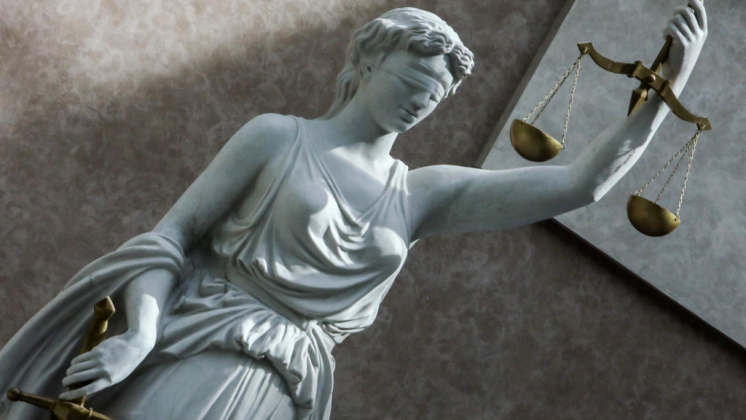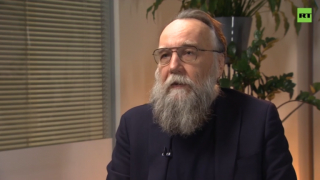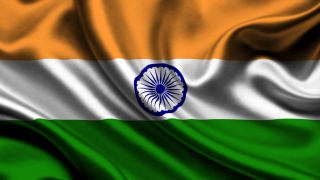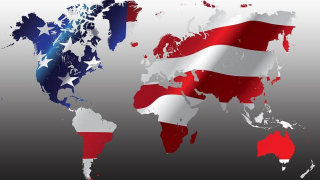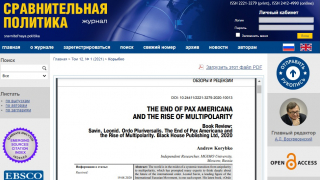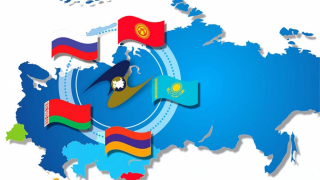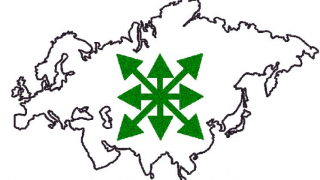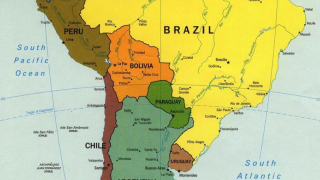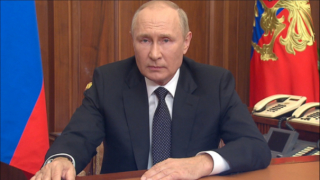Hegemony and counter-hegemony of the legal norm: towards a multipolar legal theory
If we talk about hegemony in global politics, we cannot currently consider hegemonic influence without the legal mechanisms of hegemony.
In this regard, Gramsci's theory speaks of the spiritual and cultural exploitation of the working class (proletariat) through 'bourgeois' values, thus contributing to the bourgeoisisation of the proletariat. In much the same way, European philosophy, European anthropology and European culture became the source of international law, its principles and norms.
The formation of international law in its modern form is a relatively recent process. Moreover, not so long ago, in international legal relations, there was a direct division of peoples into civilised and uncivilised. It is only since the adoption of the UN Charter in 1945 and to this day that we are witnessing a move away from the direct arrogance of the founders of the modern system of international relations.
In this regard, the theory of the origin of international law has long prevailed, according to which international law was formed in the 13th-16th centuries and perfected in 1648 with the Peace of Westphalia, and then extended to other non-European nations and civilisations.
The neo-colonial nature of international law is also still present, as the entire model of the international legal system is built on the civilisation logic of Western European states.
The main source of international law is the international treaty. The conceptual meaning of an international treaty is that the subjects of international relations (states) mutually and freely express their will.
In turn, the state as a party to an international treaty is a collective individual (international personality). Consequently, the established international order presents itself as the result of a treaty between several states.
If one looks through the prism of European history and philosophy, before the world order and the new system of international relations were established, there was a 'war of all against all' (according to T. Hobbes).
Thus, in international relations with their conventional (multilateral) structure of international treaties, the ideas of Thomas Hobbes, set out in his famous work 'Leviathan', were implemented.
Therefore, modern international law is inconceivable without bringing national legal systems up to the same legal standards. We see that international law is more than visibly influenced by European philosophy, i.e. international law is the law of European ontology.
Let us show some of the conceptual origins of modern international law.
1) Thomas Hobbes and the social contract theory.
The anti-war orientation of modern international law dates back to the Paris Pact of 1928, a treaty renouncing war as an instrument of national policy. The treaty was initiated by French Foreign Minister Aristide Briand and US Secretary of State Frank Kellogg.
In particular, Briand was urged to conclude the anti-war treaty by the activist Jameson T. Shotwell. Shotwell grew up in a Quaker family. Quakers were known for their rejection of all forms of violence and for their extensive social activities to promote the ideals of humanism and pacifism in society.
Thus, a significant part of the basis of international law was the religious part of modernised Western Christianity.
The legal basis of global international security was eventually institutionalised in the United Nations Charter, which proclaimed the principles guaranteeing the maintenance of international peace and security, the independent existence of states and the development of international cooperation.
Today, international legal norms are the embodiment of the concept of hegemonic stability.
The liberal version of this concept presents hegemony as an instrument for the stability of the international order and international security; the destruction of this stability, according to liberal ideologues, leads to new destabilisations and wars.
For example, the weakening of British hegemony led to the destabilisation of the international order. This claim is supported by the events of the 1914 World War, the establishment of fascist regimes in Europe and the Second World War. The assumption of global hegemony by the United States led to the creation of the modern international security system.
The liberal character of American hegemony underlines the fact that this world order has positioned itself as rational and the only one possible.
Since then, the military solution of political issues has become of secondary importance, as overt aggression is prohibited under international humanitarian law, but in fact allows new methods of expanding influence through network technology[1].
At the same time, a hegemon represented by the United States allows itself to ignore the norms of international humanitarian law, speculating on the values of democracy and international stability while carrying out military interventions, even using the armed forces of the North Atlantic Alliance.
However, Russia's special military operation in Ukraine has provoked strong condemnation from the Western bloc of UN countries and an unprecedented economic blockade, which in no way corresponds to international economic law, but is an anti-legal political tool in the struggle to maintain hegemony.
2) The establishment of international capitalism as the global economic norm.
At the beginning of the new era of international economics, the shift from bilateral cooperation between states to multilateral cooperation played a significant role.
The emergence of multilateral international treaties (conventions) is a distinctive feature of the modern form of globalisation, which has contributed to the creation of common principles and norms to regulate global market relations.
The development of globalisation is directly related to the spread of the market economy, which replaced the command and control system established in the socialist bloc countries. A direct factor in the spread of globalisation is the collapse of the USSR and the bloc of socialist states.
This is how global capitalism wins, which will henceforth dictate its conditions to the entire world.
The basic principle of market globalisation is respect for the so-called 'four freedoms': freedom of movement of goods, services, capital and labour. The convergence of markets gives rise to inter-state subjects of international law, which create a common legal framework for the coordination of economic policy.
Liberal theorists of international capitalism argue that the existence of a liberal hegemonic state is one of the fundamental conditions for the full development of the global market economy.
Over time, the development of global capitalism has become increasingly centralised.
Thus, in 1947, the United States initiated the General Agreement on Tariffs and Trade, which became the basis for the formation of a huge free trade area. More and more liberal-minded countries join the area.
Among other things, political-legal integration is necessary because nation states are losing their effective ability to exert control over commodity and financial markets that have long since passed a certain territory [3].
Global capitalist hegemony is thus taking shape.
The ethical-legal justification for this hegemony is the theory of human rights, which claims to be universal on a global scale.
3) Human rights as hegemonic political and legal doctrine.
The modern doctrine of human rights dates back to the Renaissance (14th and 16th centuries). During this period, the concept of humanism began to emerge, in which free will and human dignity began to be interpreted as goodness and God-like. The soul is presented as something unconditionally noble and pure. Man is considered already saved and nothing can undo his salvation. In this way, man is placed at the centre of the universe and from the point of view of law acquires a different legal status.
The ideas of empiricism and mechanism as a form of secular philosophy gained popularity in the New Age.
Empiricism - 'philosophy of experience', this doctrine recognises man's sensual experience as the only way of knowing the world. As such, it dismisses the sacredness and experience of revelation.
Mechanism - the idea that the structure of the world is like a global machine.
From this point on, the mechanism and empiricism of modernity contribute to the desacralisation of the world and man (man is a microcosm).
"The place God has in the world is the spirit in man, the place matter has in the world, the place the body has in us." - Seneca, Letters, 65, 24.
Man, in turn, is perceived as a mechanism and as such, gradually, as history passes, loses his subjectivity.
The person is replaced by an individual, and it is the individual who becomes the subject of legal relations and also of international law.
All conceptual notions (human dignity, human rights, value of one's individuality) have an abstract and therefore purely technical meaning.
The definition, legal status and meaning of the individual depend on changing political circumstances and approaches to the interpretation of international law.
The doctrinal way of interpreting law, widely used in international human rights law, allows legal norms to be interpreted according to immediate political trends.
For example, this is how the discourse on 'LGBT rights' emerged, which was conceptually derived from and subsequently became part of general human rights theory.
The main international human rights instruments are the Universal Declaration of Human Rights of 1948 and the International Covenant on Civil and Political Rights of 1966.
It is these two documents that provide the legal basis for the creation of human rights guarantees.
By broadening the scope of these texts, international bodies have thus made homosexuality, already protected under international law, a matter of public knowledge.
The result is that the process of normalising homosexuality, specific to Western civilisation, is now at the centre of the discourse of international law.
In this regard, we turn our attention to the jurisprudence of the UN Human Rights Committee.
In particular, in the 1992 cases Toonen v. State of Tasmania and Young v. Australia. These two cases are among the first official evidence of the existence of legalised same-sex relationship discourse.
In general, sexual discourse has been a public topic since the sexual revolution in the United States and Europe (in the 1960s and 1970s). The sexualisation of Western society has brought the intimate side of human relations into the public sphere and, as we have seen from the practice of the UN Human Rights Committee, into the sphere of international relations.
State participation in inter-state groupings also has the effect of transferring some of its sovereign powers. However, today the source of international obligations is not only the legal decisions of inter-state bodies, but also the interpretations of international treaty norms, which then constitute the legal order of the state through the interpretative positions of inter-state bodies, often the courts. One such body is the European Court of Human Rights.
Furthermore, the European Court of Human Rights sees itself as authorised to adapt recognised human rights in line with the evolution of European society, which may lead to the recognition of rights not directly enshrined in the European Convention for the Protection of Human Rights and Fundamental Freedoms[4].
From the jurisprudence of the UN Human Rights Committee and the European Court of Human Rights, we observe the phenomenon of the legal hegemony of Western European states. This occurs when the moral, ethical and legal particularities of a particular civilisation are presented as common to the entire world community, which does not correspond to the principle of the sovereign equality of states and the socio-cultural particularities of different civilisations.
The ontological arrogance of the architects of the international order runs through the entire system of international law.
The international community positions itself as the exclusive community, while all other states that are not part of the Declaration occupy an inclusive position. One of the main mechanisms of hegemony in international law is therefore prestige. Prestige as a sociological category can also be considered in the context of international law.
At the dawn of the creation of the United Nations (the League of Nations), the American anthropologist Melville Hescovitz and a group of scientists from the American Anthropological Association published a memorandum, expressing their opinion on the content of the Universal Declaration of Human Rights of 10 December 1948. "The declaration should be based on universal standards of liberty and justice, based on the principle that <...> a man is free only if he can live up to the accepted conception of freedom in his society."[5] The declaration is based on the principle that <...> a man is free only if he can live up to the accepted conception of freedom in his society.
Thus, whereas in Gramsci's theory of classical hegemony the ruling class wants to convince all other classes that it is based on a class consensus (the state of the whole), modern international law proceeds from the assumption that it is the destiny and right of all mankind.
This strategy of international law, reinforced by the well-known outcomes of the Cold War, has transformed the entire geopolitical reality.
Russia in the International Legal Context
In 1991, the Soviet Union of Socialist Republics ceased to exist and the Pact of Friendship, Cooperation and Mutual Assistance (Warsaw Pact) was dissolved.
The bipolar world thus ceased to exist. For the same reason, the confrontation between the two approaches to the status of property, democracy and law ceased.
The defunct Soviet Union, and later the Russian Federation, signed a number of important international legal instruments in the field of politics and human rights, thus becoming part of the legal and ideological context of Europe.
Thus, parliamentarism, legal party democracy and capitalism became part of the political and economic system of the new Russia.
The definition of our state as the 'rule of law' established a precise vector for the entire political-legal system of the Russian Federation. Thus, in one way or another, subordinating the political system of our state to the international legal system (directly or indirectly through national legislation based on international legal principles and norms).
However, the Soviet Union embarked on the path of ethical-legal integration with Western Europe as early as 1966, when it signed the first international documents in the field of human rights: the International Covenant on Civil and Political Rights and the International Covenant on Economic, Social and Cultural Rights.
Since then, from perestroika until recently, Russia has merged with the global world in an ethical and legal context.
The entire constitutional system, and consequently the sectoral legislation, is constructed in accordance with these international legal obligations.
In other words, the entire public and private legal system was based on Western values and political ideals. This remains the case today, but has recently started to change towards the sovereignty of the value-spirit, and thus of the legal system.
The situation changed dramatically with the start of the special military operation in Ukraine. The outbreak of hostilities highlighted the contradictions between Russia and Western European countries. One of the consequences of the conflict was the withdrawal of the Russian Federation from the Council of Europe (a de jure decision was taken by the
Committee of Ministers of the Council of Europe to expel the Russian Federation from the organisation).
The withdrawal of the Russian Federation from the organisation could, in a way, serve to build a model of state and legal institutions on a fundamentally different basis. Moreover, the existing model has significant drawbacks, which are being researched by some domestic scholars.
Professor Y.I. Skuratov, a recipient of the title of Doctor of Jurisprudence, concludes that "the borrowing of Western state and legal institutions, liberal political and legal ideology have become one of the reasons for the destabilisation of the national legal and political system, the increase in crime, the alienation of people from the government and the state... The modernisation of Russian society in the stream of westernisation has caused serious damage to the national legal culture..."[6].
In light of the global restructuring of the entire world order and the destruction of the unipolar model, it is necessary to develop a new legal theory that is relevant in a multipolar world[7].
Towards a multipolar legal theory
The ideas of another famous Marxist (besides the aforementioned Antonio Gramsci), Georg Lukacs, may be relevant to the formation of a multipolar world law.
This philosopher contributed greatly to the development of the concept of class consciousness.
Lukacs presented class consciousness as a belief system shared by those who collectively belong to a particular socio-economic class.
Lukacs also emphasised that class consciousness is not the aggregate consciousness of individuals of a particular class, but the integral consciousness of a group of people sharing the same class position.
On the other hand, the concept of class consciousness in capitalism according to Lukacs implies the presence of a false consciousness in the proletariat. The latter do not have a clear idea of their true interests and do not understand their real socio-historical and economic position.
Like the false consciousness of the proletariat according to Lukacs, the peoples of the modern world today are also in a false consciousness, which has abandoned its own identity in order to integrate itself into the modern political and legal system.
Thus, the false consciousness for non-European peoples includes liberalism in general and, in particular, its ethical-legal doctrine of 'human rights'.
It is possible to contrast the false consciousness for non-European peoples with a 'civilisation consciousness' that would organically correspond to the geopolitical, historical and cultural-religious code of a particular civilisation.
It should be noted that the basis for the formation of a multi-polar legal order has existed for thousands of years in the form of the legal traditions of various states and civilisations.
For many centuries, many regions of the world had their own view of man, property, crime and punishment that developed independently of the Romano-Germanic legal system, but at the same time they had self-sufficient legal institutions that organically regulated social relations in non-European societies.
[1] See for details: Savin L.V. 'Network-centric and Network Warfare. An introduction to the concept'.
[2] Giplin R. The political economy of international relations. Princeton: Princenton University Press. 1987. 85.
[3] Ohmae K. The end of the nation state: the rise of regional economies. N.Y., 1995; Scholte J.A. Globalization, First edition: A Critical Introduction. N.Y., 2000.P. 211-215.
[4] See: Mathieu B. Balancing the protection of national identity and the fulfilment of international obligations: freedom of speech on surmountable challenges // Journal of Foreign Law and Comparative Law. 2021. Т. 17. № 1. С. 20 - 21.
[5] Declaration on Human Rights, submitted to the United Nations Commission on Human Rights by the Executive Committee of the American Anthropological Association // American Anthropologist. 1947. № 49. P. 541.
[6] Skuratov Y. I. The Eurasian nature of Russia and some and modern problems of development of state legal institutions. - Ulan-Ude, 2012.
[7] See in detail: Dugin A. G. Theory of the multipolar world. Pluriversum. Tutorial. - 2015.
Translation by Lorenzo Maria Pacini

